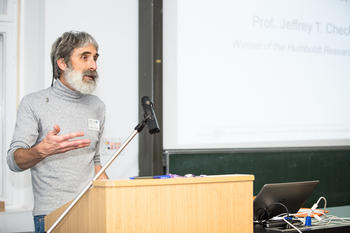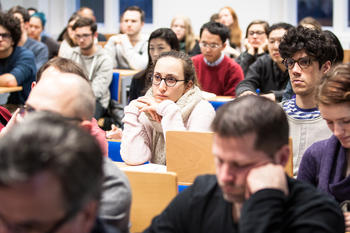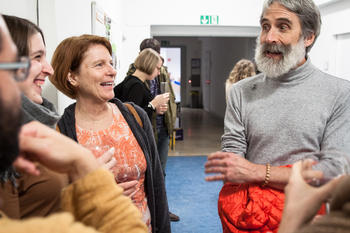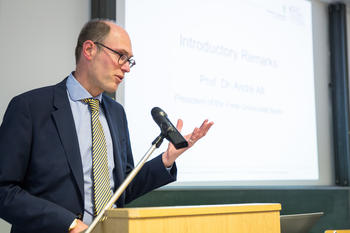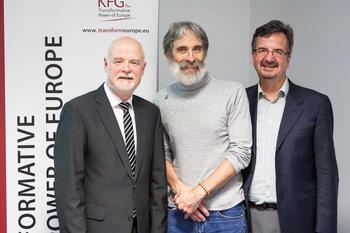Humboldt Lecture “The Social Dynamics of Civil War” by KFG Senior Fellow Jeff Checkel
Mar 02, 2016
Prof. Jeffrey T. Checkel. Photo: Martin Funck
Humboldt Lecture “The Social Dynamics of Civil War”. Photo: Martin Funck
Prof. Jeffrey T. Checkel. Photo: Martin Funck
Peter-André Alt. Photo: Martin Funck
Dr. Steffen Mehlich (Alexander von Humboldt-Foundation), Prof. Jeffrey T. Checkel, Prof. Thomas Risse. Photo: Martin Funck
On Wednesday, 27 January 2016, KFG senior fellow Jeffrey T. Checkel held his Humboldt Lecture on the occasion of winning the prestigious research grant of the Alexander von Humboldt Foundation. The topic of social dynamics of civil war drew many interested students as well as researchers to Hörsaal G in Ihnestraße 22. The lecture had been co-organized by the KFG in cooperation with the Freie Universität Berlin and the Alexander von Humboldt Foundation.
Even though there has been a noted decline of inter-state wars in recent years, the world overall has not become a more peaceful place. In Germany, the high number of refugees from civil war zones reminds us that political violence persists. Civil wars have long been the subject of research; however, one of their essential aspects, their social dynamics, has been undertheorized. In an interesting and insightful lecture, Checkel explored the topic and its theoretical and methodological implications for future research.
Introducing an Exceptional Scholar: Prof. Jeffrey T. Checkel
Prof. Dr. Peter-André Alt, president of the Freie Universität Berlin, officially opened the lecture. He stressed the importance of cooperation between universities and research-focused foundations such as the Alexander von Humboldt Foundation.
“Jeff Checkel is one of the most important IR scholars of our time. Period.” This is how Prof. Dr. Thomas Risse introduced the speaker. He remarked that Checkel had first received his undergraduate diploma in physics before deciding to delve into the sphere of political science. Similarly, he recounted that Checkel went through a number of transitions in his research, lately establishing himself as “Professor Process-tracing” at the KFG. He is now one of the regular senior fellows at the KFG thanks to the support of the Humboldt Foundation.
Civil Wars: An International Dimension
Checkel started his lecture by highlighting the rising number of civil wars in a post-Cold War setting after 1991. As he noted, civil wars have often been mischaracterized as inner-state wars. His studying of civil wars revealed that the majority of main actors had international ties – a finding that stresses the importance of thinking about civil wars as cross-border conflicts. We could observe this in the case of Kurdish transnational mobilization that was advanced by creating a sense of community.
The Importance of Socialization
While monetary incentives do motivate potential members of rebel groups, Checkel put a focus on the social mechanism of socialization. Research has demonstrated that socialization, originally thought of in the realm of everyday life, can also occur in violent settings. In fact, a sense of community is a central feature motivating members of rebel groups. Confronted with the challenge of how to theorize these empirical findings, one has to take a step back, Checkel remarked. By studying military socialization literature and anthropologists’ work on street gangs, for example, one can come to theorize violent socialization, often operating on mechanisms such as dehumanization or group rape.
Need for Research
The lack of research and under-theorization of civil wars stems, according to Checkel, from scholarly, practical, and theoretical structures surrounding political science research today. Specific changes on these three levels, but primarily an ideological shift in research away from regarding quantitative research as the “holy grail” of political science, have to be achieved in order to allow for excellent qualitative methodology and theory.
Discussing Current Implications: Socialization inside Daesh
After the lecture, Thomas Risse moderated a lively discussion provoked by questions from the audience. Among other issues, the theoretical approach of the lecture was applied to an up-to-date problem by analyzing socialization processes within Daesh.
Concluding the lecture, Dr. Steffen Mehlich, representative of the Alexander von Humboldt Foundation, thanked Checkel for the interesting insights into an evolving field of research. He noted that Checkel has been receiving a number of Humboldt Awards ever since he started his career. He joked that some of Humboldt Awardees had even won Nobel Prizes – maybe Checkel is next?!
During an informal reception afterwards, discussion and conversations continued. The KFG thanks all participants for their interest and the speakers for a successful Humboldt Lecture.
Authors: Lena Schneider & Christina Fanenbruck
